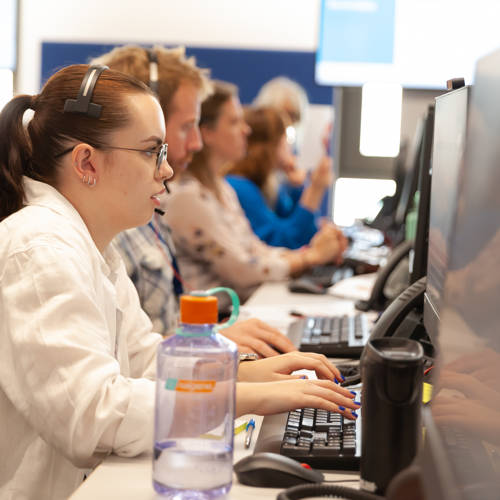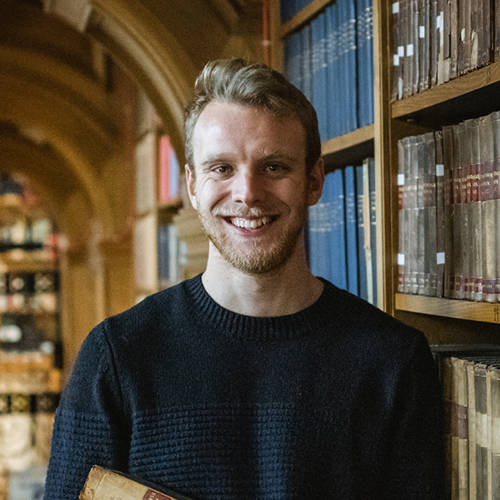Overview
Explore how science transforms lives on our Biomedical Science degree. If you're interested in how the body works and how science helps fight disease, this course is your next step into the world of medical research and healthcare.
Taught by a multidisciplinary team of expert academics in our state-of-the-art laboratories, you'll learn through hands-on experience and apply knowledge to real-world problems. Whether you’re aiming for a career in the NHS, clinical laboratories, or biomedical research, this course will prepare you with the scientific and transferable skills that employers value.
What you’ll learn
- Explore the inner workings of the human body through anatomy, physiology, and histology.
- Investigate the causes and treatments of disease using techniques in microbiology, biochemistry, and genetics.
- Develop essential practical skills through experiments and data analysis in hi-tech labs.
- Apply scientific theory to real biomedical challenges in society, from diagnostics to global health.
- Collaborate with scientists at the nearby Discovery Park through our Industry Liaison Lab.
By the end of the course, you’ll be ready for careers in biomedical science, healthcare, and pharmaceutical research, as well prepared for postgraduate study.
Joint 12th in the UK
for student satisfaction in the subject area of Biomedical Science
Complete University Guide Subject League Table 2026
Why study Biomedical Science at CCCU?
Learn from experts
Study alongside active research academics
- Select your qualification
- Select your grade
- Add it and repeat
Accepted qualifications
We accept a wide range of general qualifications that attract UCAS Tariff points either on their own or in combination with others. Below are some common examples.
| Qualification | Grades |
|---|---|
| A Levels | BBC |
| BTEC | DMM |
| Access | 15 Distinctions and 30 Merits |
| International Baccalaureate | 29 Points |
The grades in this table provide an indication of what is required to study this course. If you have qualifications that are not present in the table or want to tell us more about you specific situation then please contact our friendly Course Enquiry Team.
Don’t meet these entry requirements?
If you do not meet these entry requirements, a foundation year is a great way of beginning your university journey. We recommend you speak to our Course Enquiries team who will advise on a route to study that fits you.
More information
Contact us
Module information
Core/optional modules
How you’ll learn
Each module features a mixture of practical sessions in the laboratory, lectures, workshops and seminars. The emphasis is always on practical and applied skills development, so on a typical module we will spend more than half of our time with you in practical sessions, sometimes two thirds of the module contact time.
This is complemented by additional structured and guided learning resources we provide and curate for you. In addition, you will have time allocated for independent learning. Face-to-face teaching hours per week may vary but will typically be approximately 10-16 hours. Some modules include intensive weeks where you will have up to 24-30 contact hours in a week.
Modules feature a variety of independent learning materials that we curate and structure for you. This may include textbook chapters to read, videos to watch or research papers to review in preparation for or following on from a face-to-face session.
You might engage in online discussions, post comments or otherwise interact with fellow students or academics as well. Some of the independent learning can be accompanied by short quizzes or revision aides to help you remember the key content you have covered.
As a full-time student, you should expect a workload similar to a full-time job during the weeks of the semester (each of your two semesters is 15 weeks long).
You will be studying 60 credits worth of modules each semester, which corresponds to an overall workload of 600 hours per semester. Most of this time is set aside for your independent learning, however, you can use it flexibly around your other commitments, such as work or caring responsibilities.
Your personal academic tutor and the course team will always be there to support you in engaging with your studies and meeting the learning requirements of the course.
Face-to-face sessions are typically led by academics or biomedical professionals and practitioners with IBMS membership and HCPC registration. Our focus is on teaching and supporting you.
Occasionally, industry experts or guest lecturers may provide specialist sessions and share their expertise with you. In some of our laboratory and field practicals or IT workshops, you will be supported by PhD students alongside the academic leading the session.
The academics teaching you will have higher education teaching qualifications (such as the Postgraduate Certificate in Academic Practice, PGCAP) and may also be fellows of the Higher Education Academy (HEA) or members of professional bodies and academic organisations.
Our Biomedical Science course has been developed to cover all of the clinical specialisms and practical and professional skills you will need to develop to become a registered biomedical scientist and work in clinical and commercial labs.Carol TrimPrincipal Lecturer and Course Advocate for Biomedical Science
How you’ll be assessed
We understand, that different students have different strengths and ways of learning. This is why you will be assessed in a range of ways during your degree.
Assessments will include coursework (e.g. lab reports, lab log books), timed online questionnaires and later on in your degree presentations, scientific reports and professional practice portfolios.
You will also be assessed by in-person exams to ensure you have acquired the necessary knowledge. In your final year, you will complete a dissertation module that includes a thesis assessment in semester 2 and a presentation where you can reflect on your achievements and journey as a student.
Your future career
Graduates from the similar courses at Canterbury Christ Church University (Human Biology, Biomedical Science) have gone on to work as Clinical Respiratory Physiologist (Great Ormond Street Hospital), Research Associate at Epsilogen Ltd., Support Biomedical Scientist in Medical Microbiology and Virology (St. George’s Hospital London) and Pathology Safety Officer (Maidstone and Tunbridge Wells NHS Trust) at St. George’s Hospital London. Several of our graduates have gone on to study at postgraduate level as MSc or PhD students and some decide to pursue a career in teaching.
This course has been designed with input from industry experts and specialists to ensure that you will leave university with the skills, competencies, and professional awareness you need to pursue a career in biomedical science.Chris Harvey Section Director, Natural and Applied Sciences
Related courses
Fees
Tuition Fees for 2026/27 have not yet been finalised. These course web pages will be updated with Tuition Fee information once they have been agreed.
- Read advice about funding your degree
- See information about the financial support available for undergraduate studies
- If you would like information about paying your fees, please contact accounts.receivable@canterbury.ac.uk
- For specific fee queries, please contact fees@canterbury.ac.uk
Important Course Information
This course is designed to meet the accreditation standards of the Institute of Biomedical Science (IBMS), and we're actively working to get it accredited. Because of this, some aspects of the course, such as the academic content, module structure, types of assessments, and practical classes, might change. We have an IBMS accreditation event scheduled.
This course does not include a built-in clinical placement that would allow you to complete the HCPC (Health and Care Professions Council) competency portfolio. This portfolio is necessary to register as a Biomedical Scientist qualified to work in places like NHS clinical laboratories.
However, the course does offer an optional year in industry (or year abroad). With our support, you can use this year to arrange a clinical placement in an HCPC-accredited laboratory to complete some or all of your HCPC competency portfolio.
Industry links
Our course has been designed with input from clinical practitioners in Biomedical Science as well as speakers and lecturers with a clinical lab background who will be delivering some of your sessions.
Our Industry Liaison Lab at Discovery Park in Sandwich has facilitated research collaborations and student internships with biomedical companies located there. You will have opportunities to visit and carry out practicals at Discovery Park during your studies and we regularly have students completing dissertation projects there in collaboration with one of our industry partners.
We also host a careers fair specifically for our life science students where you can talk to employers, find out about the exciting careers they offer and get advice on how to progress into those careers with the skills you have learned. The careers fair has features talks from major biotechnology companies such as Roche.
Regulated by the Office for Students
The Office for Students (OfS) regulates Canterbury Christ Church University. The OfS is the independent regulator of higher education in England. It aims to ensure that every student, whatever their background, has a fulfilling experience of higher education that enriches their lives and careers. Further details about its work are available on the OfS website.
Apply now
Duration:
3 yearsUCAS code:
B102Location(s):
CanterburyFind out more
Sign up to hear the latest from the University, including upcoming events, useful updates, student life and more!
*We are advertising this course as ‘subject to approval.’ When we add new courses or update existing courses, we advertise the course as ‘subject to approval’. We do this to let you know the University still needs to agree to run the course. It is rare for a course not to gain approval, but it is not guaranteed. There may be changes to course and module titles, content and assessment, but we will tell you about these if there is a change. You can still apply to study a course subject to approval. We have prepared some questions and answers to tell you more.




